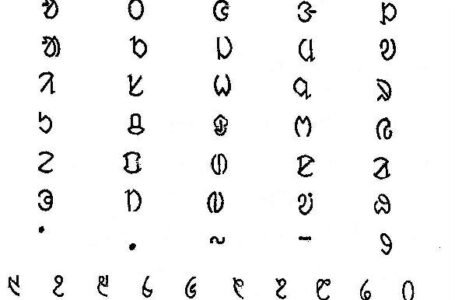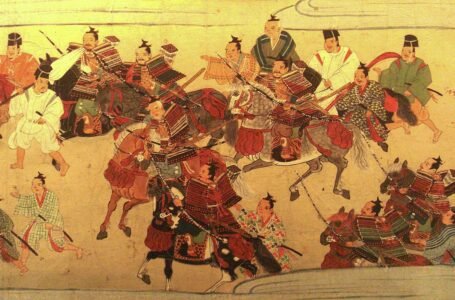Gangasati: The ‘Meerabai’ of Gujarat

Gangasati is known as the ‘Meerabai of Gujarat’. She was born in Saurashtra, Gujarat between 12th and 14th century. Gangasati is a prominent figure in Gujarat and Gujarati literature. She has adorned the Gujarati literature and culture with her mystic and mellifluous bhajans, that are sung till date. The life of Gangasati is mostly shrouded in mystery as there aren’t much written records about her. Her stories and bhajans have been transmitted orally from generation to generation. In this blog we will unveil the mysteries from the life of Gangasati – a great female saint inspiring many others.

It is said that Gangasati had lost her mother at a very tender age and was looked after by her father who was the security guard of a king. Her father loved her a lot and raised her with immense love and care. He tried his level best to fill in the gap of Gangasati’s mother. Gangasati was a prodigy. She was gifted a mellifluous voice. It seemed as if she was blessed by goddess Saraswati.
The father – daughter duo often held bhajan programs in their home. People would gather to listen to the mesmerizing and soothing voice of Gangasati. Such was the power of her mellifluous voice. Gangasati was an obedient, demure, and exquisite girl who loved her father a lot.
But since her father was the security guard of a king, he had many foes. Her father had rivalry with a lot of people who wanted to see him dead. One day during the bhajan an enemy of her father managed to enter the house and was going to kill her father but her father’s assistant came to his protection and killed the killer instead.
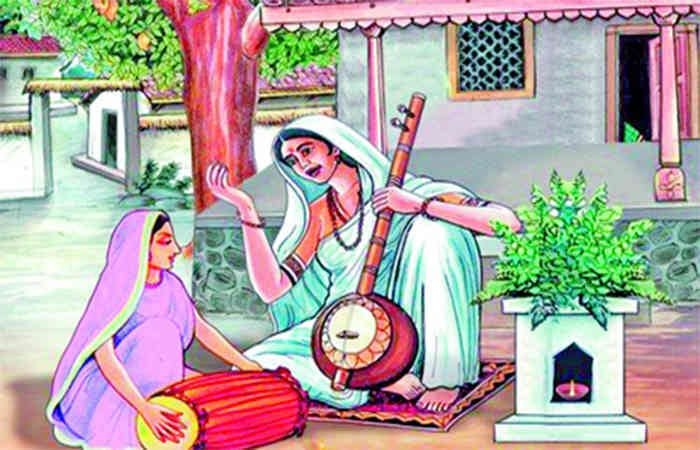
The notorious enemy killed by her father’s assistant was unfortunately the younger brother of a nefarious dacoit named Kahalsang, who was infamous for his bestial felonies. Disgruntled by his brother’s death he took vengeance by killing the assistant’s younger brother. All this bloodshed and enmity saddened her father. He wanted to put a full stop to this vendetta so he invited the dacoit Kahalsang to his house and requested him to quell this killing.
This was the first time when Kahalsang laid his lecherous eyes on Gangasati and promised her father to end the whole mayhem if he sends Gangasati to spend a night with him. Gangasati’s father loved her a lot and instantly refused the immoral demand of Kahalsang but Gangasati was an understanding girl and she fathomed her old father’s grief and stress due to killing so she convinced her father to send her to Kahalsang.
Gangasati put her chastity on the line for her father without a second thought. She truly was the embodiment of sacrifice and daughterly love. Gangasati was as pure as the holy river Ganga. She believed in the formless worship of divine God and her pristine and unblemished mind was always occupied with the thought of God. Such a pure soul she was! Yet, she took a bold decision of sacrificing her purity for her father.

Kahalsang on the other hand was really thrilled for the night. He began taking off his clothes as soon as Gangasati entered the room. But before he could lay his hands on Gangasati, a snake entered the room through the open window and bit his foot. He squealed in pain. But instead of running away, the pure hearted Gangasati took a pity on his painful state and immediately began sucking the snake poison out of his foot.
This kind act by Gangasati had won Kahalsang’s heart. He realised his mistake. He realised that he was going to commit an impropriety by molesting this pure hearted and kind lady. From that day onwards the infamous dacoit Kahalsang transformed into a moral man. He became a man with principles. He left his dacoity profession and adopted farming. He married Gangasati and started living a normal and blissful life. Gangasati taught him bhajans and both the husband and wife became an ardent follower of formless divine God. They loved singing bhajans together.
After a few years of marriage, they welcomed their son, whom they named Ajubhaa. But unfortunately, Ajubhaa turned out to be very immoral and egregious son. He never listened to his parents and would often beat them.
Gangasati and Kahalsang thought that maybe marriage would straighten him so Kahalsang fixed his marriage with the daughter of his friend named Maanbai. But Maanbai detested Ajubhaa so when she heard the news of her wedding, she refused but her father, who had already given a word to Kahalsang, didn’t listen and instead forced her into accepting the marriage.
In frustration, Maanbai committed suicide on her wedding day. Due to the fear of embarrassment and criticism her father changed the bride. He asked her younger daughter Paanbai to go and sit in the wedding.
The next day, Ajubhaa was furious to find Paanbai instead of Maanbai. He beat her black and blue. Paanbai’s father narrated the whole incident to Kahalsang and apologised for tricking him. Kahalsang and Gangasati happily accepted Paanbai as their daughter-in-law but Ajubhaa wasn’t ready to accept her as his wife.
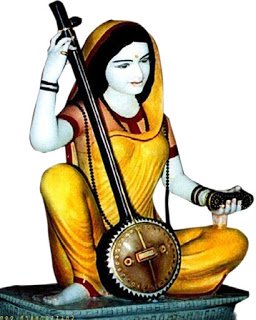
Kahalsang passed away soon after this accident leaving Gangasati and Paanbai to bear the beatings and abuses of Ajubhaa. Fed up of his beatings and expletives Gangasati and Paanbai left the house. They built a mud house near the Krishna temple and started singing bhajans day in and day out.
After a few years Gangasati also departed leaving this mortal world.
- Contribution to Gujarati Literature
Gangasati has embellished the Gujarati literature with her devotional and timeless poetry and bhajans. They are considered an indispensable part of Gujarati literature.
- Social Reform
Gangasati along with her daughter-in-law left her abusive son and lived alone in a mud house singing bhajans. Gangasati symbolised an understanding and love between mother-in-law and daughter-in-law. She also exemplified that a woman needn’t put up with her son’s beatings and expletives.
- Movie After Her
A film called ‘Gangasati’ was released in 1979 directed by Dinesh Rawal paying homage to her divine legacy.
- Devotional Bhajans
Some of the famous bhajans of Gangasati are:
- Meru Re Dage Pan Jena Manada
- Kupatra Ni Agal Panbai Vastu Na
- Chhuta Chhuta Teer Baiji
- Shilvant Sadhu Ne Vare Vare
- Vachan Viveki Je Nar Naari
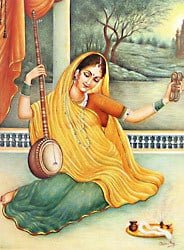
Legacy
Gangasati is no more in this mortal world but her timeless legacy keeps resonating deeply by her poems and bhajans. She remains in the hearts of all Gujaratis. She is nothing short of a maternal figure for them. Her devotional bhajans still speak of her sacrifice and her valour. Gangasati was one of a kind. She epitomised women empowerment, female love, and female sacrifice. She was like the pure river Ganga always chanting the God’s name. The poem below truly encapsulates her love and devotion towards God:
Get Ready to Live like a Pauper
Get ready to live like a pauper,
If you’re serious about bhakti.
Melt away your ego,
Feet of the guru is where lies mukti.
The world of the divine has no place
For caste, gender or race
Shed this phantom chain,
Be cool and take it easy, man.
The mantle of His woman is for those to claim,
Who are blind to flaws of others.
What do they care for hope and hanker,
Simply revel in abiding faith, sweet sister.
Be such a devotee, if you so desire,
And confide in the power of vachan.
Says Sati Ganga, listen O Panbai
Don’t settle for anything less, be His woman.
